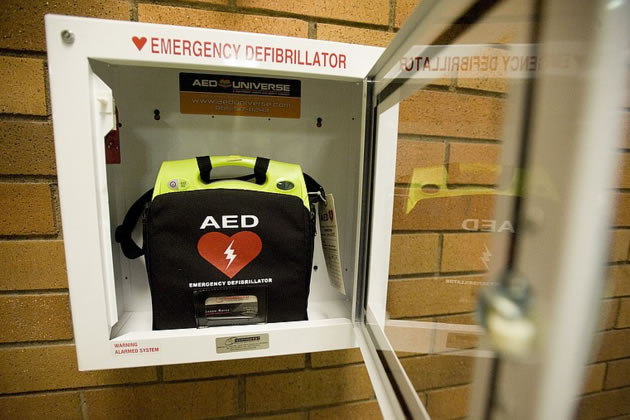Funding Available for Defibrillator Installation
Local community groups and organisations can apply

Public defibrillators are very easy to use. Picture: Wandsworth Council
June 21, 2024
In an effort to increase access to lifesaving heart defibrillators locally community groups and organisations are being encouraged to participate in funding schemes.
Support for installation costs is available through the following schemes:
- London Hearts, the leading UK heart defibrillator charity, offers applications for partial grant funding. They also provide free CPR and Defibrillator awareness training on their website.
- The Department of Health and Social Care offer match defibrillator funding for community spaces across England. Online awareness training is also provided.
While public defibrillators are very easy to use, The London Ambulance Service also provides defibrillator training for communities and organisations who would like the extra support, through its London Lifesavers campaign.
For more information and advice around getting a defibrillator for your community, visit the British Heart Foundation website.
Wandsworth Council’s Director of Public Health, Shannon Katiyo, said, ‘This initiative aims to increase the availability of defibrillators, and this is welcome. Improving your heart health is one of the best ways to lower the risk of developing coronary heart disease and this reduces the risk of a cardiac arrest. You can improve heart health by eating a healthy balanced diet, being physically active, keeping a healthy weight, and stopping smoking.’
More than 4,200 cardiac arrests happened out of hospital in London in 2023 according to the latest data from the British Heart foundation.
According to the UK Resuscitation Council and British Heart Foundation, fewer than 1 in 10 people survive cardiac arrest outside of hospital, and a big contributor to this is not being able to provide defibrillation within a critical time period.
A defibrillator is an easy-to-use, portable device that guides cardiopulmonary resuscitation (CPR), assesses heart rhythms and can deliver a controlled electric shock to the chest safely. It tries to get the heart to beat normally again when someone has had a cardiac arrest, which can be hugely important while you wait for emergency services to arrive. If a defibrillator is used within three to five minutes of a cardiac arrest, the chance of survival increases from 6% up to 50-70%.
Half of out of hospital cardiac arrests are witnessed by a bystander. This is why having 24/7 public access defibrillators in as many community settings as possible is still so important. The British Heart Foundation advises that a defibrillator should be within 200 metres reach of a community space, or a brisk, or a four-minute walk roundtrip. While these already exist in some high-traffic places like railway stations, schools, places of worship, and some community centres and shops, more are needed in our community spaces to achieve the recommended coverage.
Many instances of cardiac arrest happen because of an underlying heart condition. Residents aged 40 and over can help to reduce their risk of developing common conditions, like heart disease and stroke, by going for a free, 20-minute NHS Health
You can also speak to organisations such as Wandsworth Health Watch who can provide you with more information and help you to identify the services and support you may need.
Like Reading Articles Like This? Help Us Produce More This site remains committed to providing local community news and public interest journalism. Articles such as the one above are integral to what we do. We aim to feature as much as possible on local societies, charities based in the area, fundraising efforts by residents, community-based initiatives and even helping people find missing pets. We've always done that and won't be changing, in fact we'd like to do more. However, the readership that these stories generates is often below that needed to cover the cost of producing them. Our financial resources are limited and the local media environment is intensely competitive so there is a constraint on what we can do. We are therefore asking our readers to consider offering financial support to these efforts. Any money given will help support community and public interest news and the expansion of our coverage in this area. A suggested monthly payment is £8 but we would be grateful for any amount for instance if you think this site offers the equivalent value of a subscription to a daily printed newspaper you may wish to consider £20 per month. If neither of these amounts is suitable for you then contact info@neighbournet.com and we can set up an alternative. All payments are made through a secure web site. One-off donations are also appreciated. Choose The Amount You Wish To Contribute. If you do support us in this way we'd be interested to hear what kind of articles you would like to see more of on the site – send your suggestions to the editor. For businesses we offer the chance to be a corporate sponsor of community content on the site. For £30 plus VAT per month you will be the designated sponsor of at least one article a month with your logo appearing if supplied. If there is a specific community group or initiative you'd like to support we can make sure your sponsorship is featured on related content for a one off payment of £50 plus VAT. All payments are made through a secure web site. |